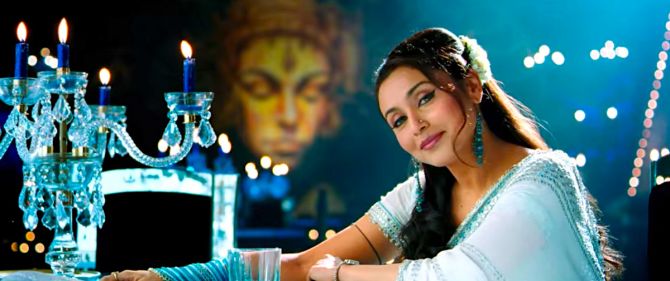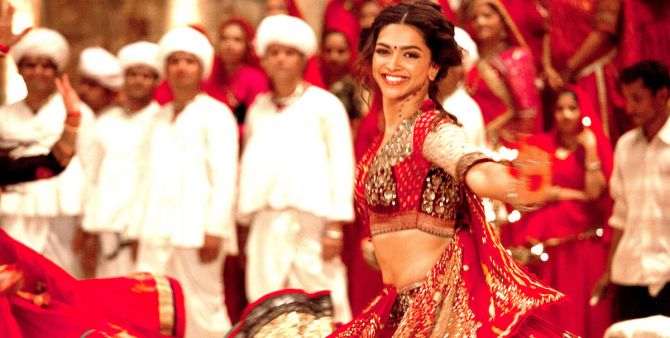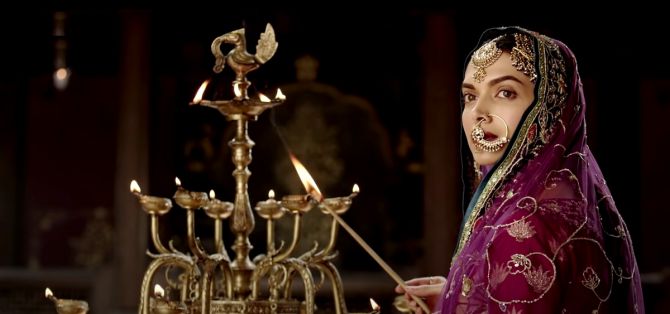Every frame is a dream unfolding before our eyes.
Every emotion is akin to poetry.
Sanjay Leela Bhansali's cinema believes in grand expressions of love and luxury.
But at the centre of his magnificence is always a woman fuelled by her passions, be it to break free from the shackles of social norms or sacrifice herself for its very sake.
Gentle, fiery, magnanimous or disadvantaged, there are many faces of the Bhansali heroine. Sukanya Verma looks at every single one.
Got a favourite? Share below.
Annie, Khamoshi-The Musical

In Bhansali's sentimental debut set in Goa, Manisha Koirala plays the daughter of a deaf and mute couple who has inherited her grandmother's love and talent for music.
Between her responsibility towards her folks and yearning for song that grows tenfold after she falls in love with a charming musician, played by Salman Khan, there are challenges and conflicts galore.
Except the soft-spoken, soulful Annie truly believes in 'woh zindagi hi kya jismein koi namumkin sapna na ho.'
Neither her pregnancy out of wedlock nor her near-death in a road accident comes in the way of that.
Nandini, Hum Dil De Chuke Sanam

Rich in culture, colours and shringar, Hum Dil De Chuke Sanam's picture-perfect musical pays rich ode to Aishwarya Rai's beauty and spirit as the rebellious Nandini.
Though the respected classical musician's darling daughter is bold enough to fall in love with his charismatic pupil from Italy, she is forced to marry against her wishes.
When the opportunity presents itself, Nandini breaks all conventions and goes out of her way to follow her heart's impulses only to settle for a surprisingly traditional, timid conclusion.
Paro, Devdas

Sarat Chandra Chattopadhyay's tragic novel has numerous cinematic iterations but none as gilded as Bhansali's.
And so the poor but proud Paro, a childhood sweetheart of Devdas who agrees to marry a wealthy, elderly man after her cowardly beau turns her away in the middle of the night, transforms into a designer costume clad vision of sartorial delight.
Despite her marital status, Paro continues to light a lamp for her beloved Dev till the heart-breaking end.
Aishwarya Rai's ease around such opulence is tailor-made for this part.
Chandramukhi, Devdas

As for the other woman in Devdas's life, courtesan Chandramukhi is well-aware that her object of affection pines for Paro and rues over his bad decisions that let him go over countless bottles of wine.
But instead of seducing, nagging or lecturing, she tolerates his barbs, indulges his whims, understands his despair and dedicates her life to serving him until he, too, realises and reciprocates.
Madhuri Dixit paints this picture of unconditional devotion with dollops of glamour and grace.
Michelle McNally, Black

Rani Mukerji's committed portrayal of a visually, hearing impaired girl in Black, inspired by Helen Keller's autobiography earned her tons of awards and acclaim.
Although it is visibly stark and austere compared to Bhansali's flamboyant films, there's no dearth of melodrama and lyricism in his depiction of the Anglo Indian Michelle McNally's journey from 'animal' to achiever.
How she never stops trying and lives up to her teacher's unwavering faith in her while tackling her complexes and curiosities forms the crux of her inspiring story.
Sakina, Saawariya

Misunderstood or maligned, it's a never-ending debate but Bhansali's resplendent labour of love and adaptation of Fyodor Dostoevsky's short story, White Nights has the demeanour of a painting.
Debutante Sonam Kapoor is luminous, lovely as Sakina, the shy, mysterious young woman waiting for the love of her life to return while enjoying Ranbir Kapoor's playful, friendly company.
Saawariya gloats in its mood, a bit excessively so but once in a while one gets a glimpse into Sakina's heart and its ardent declarations -- Jinke saath mohabbat ka noor hota hai unhe koi andhera chu nahi sakta.
Gulab, Saawariya

After an author-backed role in Black, Rani Mukerji returns for a supporting part in Bhansali's most dramatic production.
Besides narrating the doomed love story and offering Ranbir's romantic gyaan, the actress puts on fake eyelashes, drapes herself in garish saris and plays to Bollywood's loud ideas of the lady of the night.
Sophia D'Souza, Guzaarish

Aishwarya Rai Bachchan's pairing with Bhansali and Hrithik Roshan has always sprung great results for the actress.
Though Guzaarish bombed, everyone heaped praises on Hrithik's role as a quadriplegic pleading for euthanasia as well his dazzling chemistry with Ash.
Keeping Bhansali's fantasy imagery in mind, her Sophie D'Souza -- a long-suffering victim of domestic abuse and compassionate caretaker to Hrithik, sashays before us in bold red lips, vintage hairdos and old world Europe-inspired Sabyasachi gowns.
Lest we forget, in a Bhansali movie -- strength of character is directly proportional to striking make-up.
Leela, Goliyon Ki Raasleela: Ram Leela

Full of fire, sass and nerve, Bhansali's Juliet is no demure doll.
Daughter of the Sanera clan chief, Leela not only falls in love with the enemy but readily elopes to marry him and stays loyal even after he deserts and deceives her across a series of unfortunate misunderstandings.
From sneaking off to meet her Ram in the balcony to slicing off her finger as a mark of protest against her ruthless mum to taking her place and telling off her estranged beau of the suffering she's endured, Leela is one heck of a livewire.
And Deepika Padukone grabs the sur of this character to perfection.
Mastani, Bajirao Mastani

It's love at first sight for Bundelkhand's warrior princess as she crushes on the much married Maratha Peshwa Bajirao I while alternating between Bhansali's Anarkali-inspired muse, a sword wielding lioness or the socially-condemned other woman.
Deepika Padukone's wobbly Urdu aside, the actress is head-to-toe ethereal consumed by her forbidden affections and ready with a rejoinder to anyone who dares question it.
Kashibai, Bajirao Mastani

As the title suggests, the love story between Bajirao and Mastani takes centre stage but it is Kashibai's wronged wife who walks away with all sympathy.
Kashibai and Bajirao are a picture of marital bliss. She dotes on him. He relies on her.
They seem to share a terrific romantic equation as well until Mastani's entry.
Bhansali's glorious emphasis on Kashibai's grief and Priyanka Chopra's spunky delivery of it, summed up in that one memorable line, 'Aap humse hamari zindagi maang lete hum aapko khushi khushi de dete, par aapne toh humse hamara guroor cheen liya,' makes Bajirao's betrayal all the more inexcusable.
Padmavati, Padmaavat

A Sinhalese native turned Rajput queen, Rani Padmavati upholds the age-old ideals of honour and virtue to the extent that she's ready to commit jauhar in what is easily Padmaavat's most controversial sequence.
A statuesque Deepika Padukone stands behind her husband and the ruler of Chittor after a battle is declared between him and the barbaric Sultan Alauddin Khilji following the latter's lustful proposal.
She doesn't let Khilji win till the end the only way she knows against Bhansali's furiously-shot climax evoking memories of Mirch Masala.
Gangubai Kathiawadi, Gangubai Kathiawadi

Based on S Hussain Zaidi's Mafia Queens of Mumbai, Bhansali documents the life and times of Mumbai's notorious red-light area Kamathipura resident and brothel madam turned crusader for sex worker rights in Alia Bhatt-led Gangubai Kathiawadi.
It's a tall order but young Alia's enthusiasm is unmistakeable in giving her all for the heftiest role of her career under Bhansali's leave-no-stone-unturned treatment.
Feature Presentation: Aslam Hunani/Rediff.com











